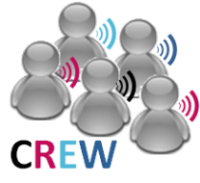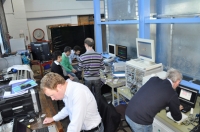|
Three experiments were selected after the first open call. The experiments are not finished yet, but below a very short status update is already provided.
University of Durham. A sensitivity experiment to characterise the performance of COTS and custom designed sensing engines was performed in the large anechoic chamber at Durham University. Both high end and low cost sensing engines that are available in the CREW federation, as well as the digital frequency swept channel sounder at Durham University were characterised using simple waveforms such as CW and more demanding signals such as frequency hopping. Sensing engines with direct down conversion techniques as well as swept techniques formed part of the experiment. The first results indicate that for some types of waveforms, even low cost sensing devices provide accurate results, but that only the high end devices perform well with all types of signals.
Technical University Ilmenau. The TUIL’s experiment aims at reducing the sensing latency of a software implementation of a Carrier Sense Multiple Access (CSMA) based MAC protocol by integrating a dedicated spectrum sensing engine. The experiment benefits from two cognitive components from the CREW project: the Iris reconfigurable SDR developed at Trinity College Dublin and the IMEC sensing engine (SE). The SE is connected to the PC via USB and the parallel port and complements the USRP2 as radio transceiver. Preliminary results indicate a 50% reduction of the sensing delay compared to a fully based software implementation of the CSMA protocol.
Tecnalia Research & Innovation. TECNALIA's experiment focuses on assessing the performance of different data fusion algorithms applied to collaborative spectrum sensing. Hard-decision fusion algorithms will be compared to soft-decision ones (based on LSC techniques) and two different algorithms will be employed to compute the LSC coeficients: Genetic ones and Tecnalia's own Optimized Harmony Search one. So far, Thales Communications and Security "Transceiver Facility Implementation API" has been employed to controlled the sensing devices and data fusion algorithms have been implemented as Iris blocks.
| 
